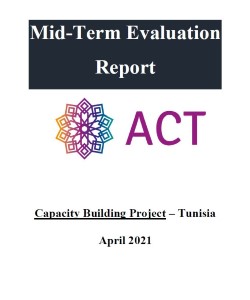Mid-Term Evaluation Report ACT Capacity Building Project - Tunisia
About the publication
- Published: 2021
- Series: --
- Type: NGO reviews
- Carried out by: Béchir Bouraoui
- Commissioned by: --
- Country: --
- Theme: --
- Pages: 35
- Serial number: --
- ISBN: --
- ISSN: --
- Organization: Digni/ Norwegian Lutheran Mission (NLM)
- Local partner: Association for Cooperation and Transformation (ACT)
- Project number: QZA-18/0159-329

Summary of the evaluation:
Mid-Term Evaluation Report ACT Capacity Building Project - Tunisia
Background:
The goal of this project is strengthening the civil society in Tunisia with the ability and capacity to promote democratization, human rights relation, and poverty reduction. Five local associations are given practical training and mentoring during application and implementation of a project. The project period is 2019-2022.
Purpose/objective:
The purpose of the evaluation was to assess the project progress and results in the four major areas of Relevance, Effectiveness, Efficiency and Sustainability as well as to provide recommendations for the remaining project period. The evaluation cover approximately the first two years of the project.
Methodology:
One of the main purposes of the evaluation was to help the Management team to reinforce its internal monitoring, evaluation, and learning (MEAL); therefore, the methodology has a horizontal, integrative approach. The following four tools were used to get information; (1.) Document analysis, (2.) Focus group conversations from local partner ACT and the local associations (3.) Semi-structured individual interviews, and (4.) survey using evaluative questions and the monitoring tools Organizational Capacity Assessment (OCA) and Capacity Assessment for Project Implementation (CAPI)
Key findings:
The project was remarkably relevant, in that it correctly identified the lack of social cohesion as a major problem of the targeted beneficiaries and developed strategies and activities that specifically addressed the needs of the beneficiaries. The project was broadly effective, in that in that most of the planned activities were implemented, and planned results were essentially achieved. The level of effectiveness was high. The project was appropriately managed in financial and administrative terms, and activity monitoring by the ACT team was consistent with original commitments. The project team was competent and committed; it is clear that its pro-active attitude contributed to the success of the project.
The project also achieved identifiable and attributable elements of impact, and have elements of sustainability. The micro-projects are sustainable to the extent they were specifically designed to last beyond the project period, through self-financing. New skills were also acquired by communities, and by ACT itself, which should also contribute to the sustainability of the project’s results.
Recommendations:
The evaluation report comes with various recommendations within the different themes of the project. They recommend an emphasis on PR and visualization, more individual training plans (since the local associations has different needs) more advocacy and inclusion of vulnerable groups.
For the training of the local associations, they highly recommend individual set-up sessions with professionals where they are focusing on different topics.
When it comes to sustainability, visualization and network building are important.
Comments from the organisation, if any:
Association for Cooperation and Transformation (ACT) have presented a response to the recommendations through 4 categories, (1. Communication, Marketing Plan & Visibility; 2. Individual tailormade Follow Up; 3. Social Inclusion & Future Projects; 4. Networking & Trainings) they show how they are implementing the recommendations in their plans. They also explain the reasons for not following the recommendations in two points, hiring a Community Manager, and set up a training for developing a policy paper.
Digni/Norwegian Lutheran Mission:
The evaluation report describes a successful project in many ways and provides relevant and important recommendations for improvement. At the same time, the project has low scores on the monitoring tools used for organizational capacity. The consultant writes that the project gives value for the money but has mainly assessed what the organization has been allocated. Recommendations have been made to work more with PR and visualization, more individual training since the organizations have different needs, more network building, more advocacy, and the inclusion of vulnerable groups. ACT, in collaboration with the local associations (LA), has responded well to the recommendations and follow-up. We agree with their assessments that, at this time of the project, it is probably not realistic or of interest for the local associations to set up a training especially for developing policy papers. We also support their plans to promote visibility and developing their existing tools first before adding new staff or new tools.
The project has been significantly hindered by the pandemic and other external factors and have been given a one-year extension.
